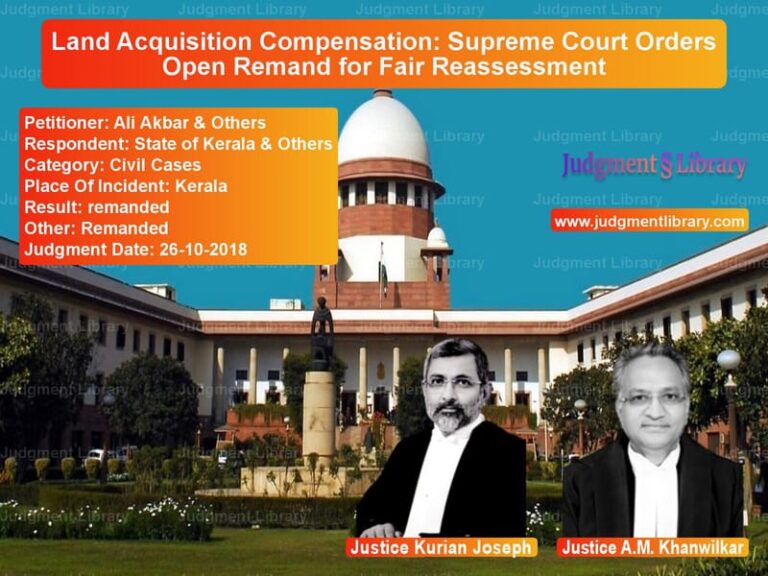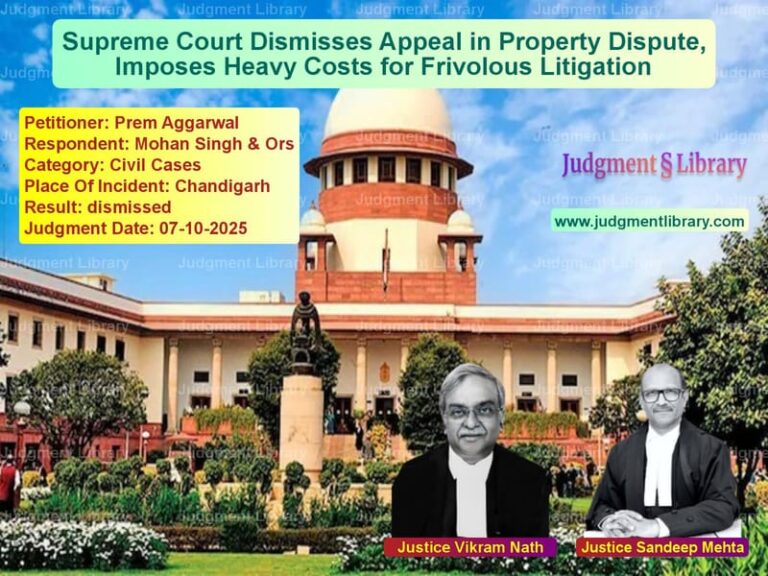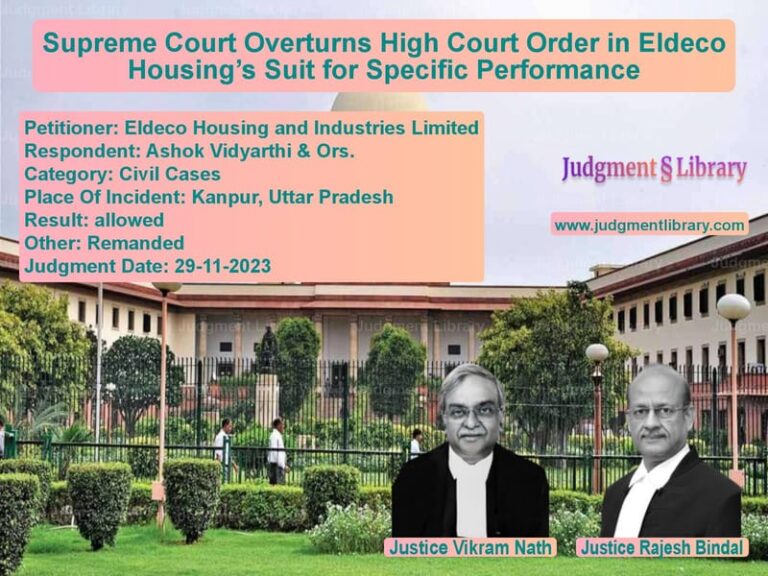Supreme Court Ruling on Amendment of Cognizance in Prevention of Corruption Act Cases
The Supreme Court of India in Criminal Appeal No. 398 of 2016 dealt with an important issue concerning the power of the Trial Court to amend its previous decision to take cognizance of offenses under the Prevention of Corruption Act, 1988. The case arose from a challenge filed by the State (through CBI, ACB, Hyderabad) against the High Court’s order in a revision petition filed by the respondent, Dharmana Prased Rao.
Background of the Case
The case began when the CBI filed a charge sheet against the respondent and 13 other accused, charging them under Section 13(2) read with Section 13(1)(C)(D) of the Prevention of Corruption Act (PC Act), along with offenses under Sections 420, 409, 467, 468, 471, and 120B of the Indian Penal Code. The accused included government ministers. The Trial Court had initially deferred taking cognizance of the offenses, asking the Investigation Officer to provide necessary sanction as required under Section 19 of the PC Act. However, after the Investigation Officer clarified that no sanction was needed, the Trial Court took cognizance of the offenses. The respondent challenged this decision, and the High Court allowed his revision petition, arguing that the Trial Court had exceeded its authority by reviewing its earlier order.
Petitioner’s Arguments
The CBI, representing the appellant, argued that:
- The High Court erred in quashing the Trial Court’s order taking cognizance of the offenses under the PC Act.
- The Trial Court’s order was not a review of its earlier decision, but a correction based on the clarification provided by the Investigation Officer that no sanction was required.
- Section 362 of the Code of Criminal Procedure (CrPC) does not apply in this case because the Trial Court had not passed a final order disposing of the case; it had only deferred its decision.
Respondent’s Arguments
The respondent contended that:
- The Trial Court’s order amounted to a review of its earlier decision, which was not permitted.
- Since the Trial Court had initially refused to take cognizance due to the absence of sanction, it could not later take cognizance without a fresh sanction as required by Section 19 of the PC Act.
- The High Court’s decision to quash the cognizance was based on sound legal reasoning and should be upheld.
Judgment
The Supreme Court examined Section 362 of the CrPC, which limits a court’s ability to alter or review its judgment or order after it has been signed. The Court observed:
“The provision debars the Court from altering or reviewing the judgment only when it has signed its judgment or when it has passed a final order disposing of a case. In the present case, the Trial Court had merely deferred taking cognizance, awaiting clarification from the Investigation Officer regarding the sanction.”
The Court further noted that the Trial Court’s order on September 13, 2012, was not a final order but rather a reminder to the Investigation Officer to meet certain requirements. The Court stated:
“The Trial Court had not passed any final order disposing of the case. Its decision to take cognizance was not a review but a correction after the Investigation Officer clarified that no sanction was required.”
The Court also referenced its earlier judgments regarding the scope of Section 362 CrPC and reaffirmed that the Trial Court had the authority to take cognizance when the conditions for sanction were clarified. The Court concluded:
“The High Court erred in treating the Trial Court’s action as a review. The Trial Court was within its rights to take cognizance after receiving the clarification from the Investigation Officer.”
As a result, the Supreme Court set aside the High Court’s order and allowed the appeal, remanding the case for further consideration. The Court emphasized that the Trial Court was not bound by the initial decision to defer cognizance, especially in light of new information regarding the need for sanction.
Key Takeaways
- Courts have the authority to correct or amend their decisions if new information or clarifications arise, as long as the original decision was not final.
- Section 362 of the CrPC does not apply to non-final orders, and courts may take cognizance or amend decisions based on fresh information.
- The judgment reinforces the principle that trial courts must have the flexibility to ensure justice is served, especially when clarification on procedural requirements is received.
This judgment underscores the importance of clarity in procedural law and the need for flexibility to ensure that technicalities do not prevent the pursuit of justice in corruption cases.
Don’t miss out on the full details! Download the complete judgment in PDF format below and gain valuable insights instantly!
Download Judgment: State through CBIAC vs Dharmana Prased Rao Supreme Court of India Judgment Dated 26-04-2016-1741854776674.pdf
Direct Downlaod Judgment: Direct downlaod this Judgment
See all petitions in Money Laundering Cases
See all petitions in Fraud and Forgery
See all petitions in Judgment by A.K. Sikri
See all petitions in Judgment by R K Agrawal
See all petitions in allowed
See all petitions in Remanded
See all petitions in supreme court of India judgments April 2016
See all petitions in 2016 judgments
See all posts in Criminal Cases Category
See all allowed petitions in Criminal Cases Category
See all Dismissed petitions in Criminal Cases Category
See all partially allowed petitions in Criminal Cases Category







